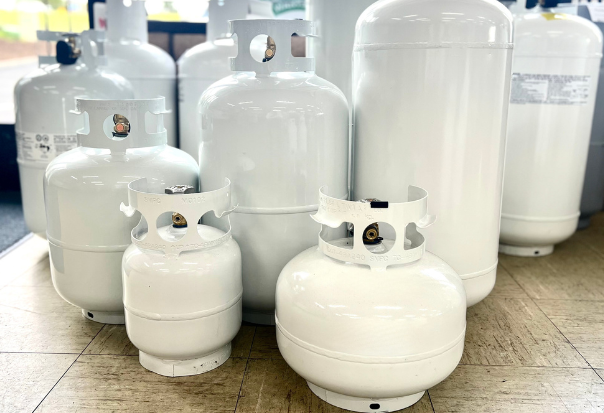Master the art of using, storing, and enjoying small propane tanks for your summer adventures with essential safety tips and usage ideas.
As summer unfolds with its array of outdoor activities, small propane cylinders become indispensable tools for enhancing outdoor experiences. From powering barbecues and camp stoves to lighting up patio heaters, the versatility of these cylinders is unmatched. However, their convenience comes with the responsibility of safe handling to ensure your summer fun remains safe. Here’s your comprehensive guide to using, transporting, storing, and maintaining small propane tanks, along with their diverse applications in summer activities.

Using Small Propane Tanks Safely
– Check for Leaks: Always perform a leak check using a soap and water solution before using the tank. Bubbles indicate a leak, which means the tank should not be used until it is repaired.
– Ensure Proper Connection: Secure all connections tightly to avoid gas leaks, which can pose significant hazards.
– Operate in Well-Ventilated Areas: To prevent the dangerous buildup of carbon monoxide, use propane-powered equipment outdoors or in well-ventilated areas.
 Transporting Small Propane Cylinders
Transporting Small Propane Cylinders
– Secure Transportation: When transporting small propane tanks, ensure they are securely fastened in an upright position in your vehicle to prevent them from tipping over and potentially causing a gas leak.
– Ventilation: Keep your vehicle well-ventilated during transportation to prevent any gas build-up should a leak occur.
– Immediate Removal: Remove the propane cylinders from your vehicle as soon as you reach your destination to minimize risk.
 Storing Small Propane Tanks Correctly
Storing Small Propane Tanks Correctly
– Outdoor Storage: Propane tanks should be stored outside, away from living spaces, to prevent gas accumulation if a leak occurs.
– Upright and Cool: Store cylinders upright in a cool, shaded area to prevent the pressure inside the tank from increasing, which could lead to a gas release or explosion.
 Maintaining Your Propane Tanks
Maintaining Your Propane Tanks
– Regular Inspections: Check your tanks regularly for signs of wear such as rust, dents, or heavy discoloration.
– Timely Replacement: Replace outdated or damaged tanks to avoid safety risks.
– Proper Disposal: Dispose of non-usable tanks appropriately by returning them to a propane supplier or a hazardous waste disposal facility.
 Diverse Uses of Small Propane Cylinders in Summer
Diverse Uses of Small Propane Cylinders in Summer
– Cylinder Sizes: Small propane cylinders commonly used in summer activities include the 1-pound, 20-pound, and 30-pound sizes. The 1-pound cylinders are portable and ideal for camping gear, while 20-pound cylinders are perfect for grilling and patio heaters, and the 30-pound tanks are suited for longer-term or larger-scale applications like RVs.
– Grilling and Cooking: Essential for outdoor cooking, whether you’re flipping burgers on the grill or cooking a stew on a portable stove.
– Heating and Lighting: Useful in powering outdoor heaters and torches that illuminate your nighttime gatherings.
– Camping Essentials: Powers various camping gears such as lanterns, heaters, and stoves, making your camping trips comfortable and enjoyable.
– Weed Control: An eco-friendly way to manage weeds in your garden without the use of harmful chemicals.
FAQs about Propane Safety
– Q: What should I do if I smell gas around my propane tank?
– A: If you smell gas, shut off the valve if it is safe to do so and call your propane provider immediately from a safe distance.
– Q: How often should I replace my propane cylinder?
– A: Propane cylinders should be inspected regularly and replaced every 12 years or as soon as any signs of wear such as rust or damage are evident.
– Q: Is it safe to leave my propane tank in the sun?
– A: No, it’s best to store propane tanks in a shaded or cool area away from direct sunlight to prevent the gas from expanding and increasing pressure inside the tank.
– Q: Can small propane tanks be refilled?
– A: Some small propane cylinders are refillable, like the 20-pound tanks, while others, such as the 1-pound tanks, are typically single-use and should be properly disposed of after the gas is depleted.
Q: How should I dispose of cylinders?
- A: NEVER dispose of your propane cylinder by throwing it in the trash. Check to see if there are municipal programs for collection in your area, or contact your propane retailer for guidance on disposal of the cylinder.
– Q: Can I paint my propane tank to make it more decorative?
– A: No, painting propane tanks is not recommended as incorrect paint can lead to overheating and safety hazards.
By following these guidelines and embracing the versatility of propane, you can ensure a safe, enjoyable summer filled with warm gatherings, delicious meals, and memorable adventures. Remember, safety is the key to making the most of your propane-powered activities.
NEED A REFILL?
Stop by one of our locations that refills small propane tanks before your next summer adventure.
Additional Sources:
https://outdoorgeeky.com/where-to-store-small-propane-tanks/
https://storables.com/articles/how-to-store-propane-tanks-at-home/
